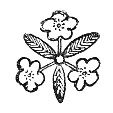| 1999-2004 (Return to Web Text-ures) |
Click Here to return to The Japanese Twins Content Page Return to the Previous Chapter |
 (HOME) |
|
I THE DAY THE BABY CAME 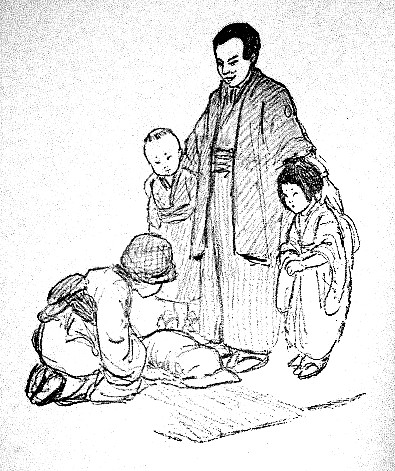
TARO and Take were standing right beside their Father early one morning when the nurse came into the room with a bundle in her arms. It was a queer-looking, knobby kind of a bundle, and there was something in it that squirmed! The nurse looked so happy and smiling that the twins knew at once there must be something very nice in the bundle, but what it was they could not guess. Taro thought, "Maybe it's a puppy." He had wanted a puppy for a long time. And Take thought, "Perhaps it's a kitten! But it looks pretty large for a kitten, and it doesn't mew. Kittens always mew." And they both thought, "Anyway, it's alive." 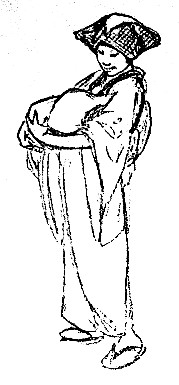
The nurse carried the bundle across the room. She knelt down on the floor before the Twins' Father and laid it at his feet. The Twins' Father looked very much surprised, and as for Taro and Take, they felt just exactly the way you feel when you look at your stocking on Christmas morning. They dropped down on their knees beside the bundle, one on each side of their Father. They wanted dreadfully to open it. They wanted so dreadfully to open it that they had to hold their hands hard to keep from touching it, but they never even laid a finger on it, because the nurse had given it to their Father! Taro just said aloud: "Is it a puppy?" At the very same moment Take said: " Is it a kitten?" And then their Father said: "I haven't opened the bundle yet, so how can I tell? We must ask the nurse. What is it, Natsu?" And Natsu, the nurse, put her two hands together on the matting in front of her, bobbed her head down nearly to the floor, and said: "It is a little son, Master. Will you accept him?" Then the Father sat right down on the floor, too, between Taro and Take. He took the little squirming bundle in his arms, and turned back the covers -- and there was a beautiful baby boy, with long, narrow eyes and a lock of hair that stood straight up on the top of his head! "Oh! Oh! Is he truly ours -- a real live baby, for us to keep?" cried Take. 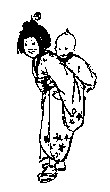
"Would you like to keep him?" her Father asked. Take clapped her hands for joy. "Oh, yes, yes!" she said. "For then I can have a little brother of my own to carry on my back, just the way O Kiku San carries hers! I've never had a thing but borrowed babies before! And O Kiku San is not polite about lending hers at all! Please, please let me hold him!" 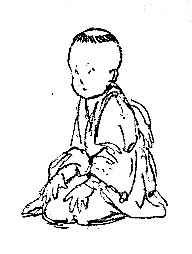
She held up her arms, and the Father laid the little baby in them very, very gently. Taro was so surprised to see a baby in the bundle that he had not said a word. He just sat still and looked astonished. "Well, Taro, how is it with you?" said his Father. "Would you like to keep the Baby, too?" "I'd even rather have him than a puppy!" said Taro very solemnly. And that was a great deal for Taro to say, for he had wanted a puppy for ever so many weeks. "So would I rather have him than a puppy," the Father said; "ever so much rather." Just then the Baby puckered up his nose, and opened his little bit of a mouth -- and a great big squeal came out of it! You would never have believed that such a big squeal could possibly come out of such a little mouth. And he squirmed more than ever. Then Natsu, the nurse, said, "There, there, little one! Come to your old Natsu, and she will carry you to Mother again." "Let me carry him,'' Take begged. "No, let me," said Taro. But Natsu said, "No, no, I will carry him myself. But you may come with me, if you want to, and see your Mother." 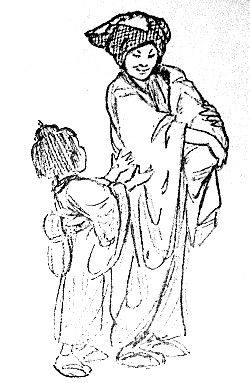
So Taro and Take and their Father all tiptoed quietly into the Mother's room, and sat down on the floor beside her bed. They sat on the floor because everybody sits on the floor in Japan. The bed was on the floor, too. It was made of many thick quilts, and the pillow a little block of wood! We should think it very uncomfortable, but the Twins' Mother did not think so. She lay with the wooden pillow under her head in such a way that her hair was not mussed by it -- instead, it looked just as neat as if she were going to a party. And it was just as nice as a party, because they all had such a happy time together watching the new baby. Bōt'Chan acted just like all the other babies in the world. First he got his fist into his mouth by accident, and sucked it. Then he got it out again without meaning to, and punched himself in the nose with it -- such a funny little nose, no bigger than a small button! Then he opened his mouth wide and yawned. "See how sleepy the little mouse is," said the Mother. "Run out and play now, my children, and let him rest." Taro and Take left the room softly and went out on the porch. They sat down on the top step to talk over the wonderful thing that had happened. 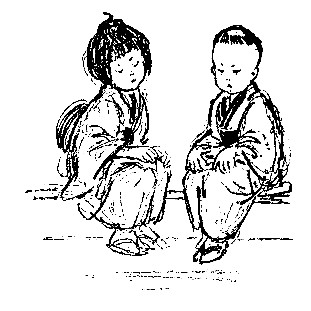
It was springtime and the flowers in the garden were just pushing their leaves through the ground. The sun was shining, and a little new yellow butterfly, that had only just crept out of its snug cocoon that very day, was dancing about in the sunshine. "I suppose we were new once, too, weren't we?" said Take, watching the butterfly. "I suppose we were," Taro answered. "We grew right up out of the root of a tree. Natsu told me so." "I wonder which tree it was," Take said. "It must have been one of the trees in our own garden, of course," Taro answered; "or else we shouldn't be here." "Wouldn't it have been a terrible accident if we had happened to grow in some other garden" said Take. She looked quite scared just at the very thought of such a thing. "Maybe if we had we shouldn't have been ourselves at all," Taro answered. He looked a little scared, too. "Who should we have been, then?" asked Take. "I don't know, I'm sure," Taro said. "I can't think. But, anyway, we're lucky that it didn't happen. We're here -- and we're ourselves!" "Let's go into the garden this minute and see if we can find Bōt'Chan's tree," said Take. "He's so new that maybe we can find the very spot where he grew." 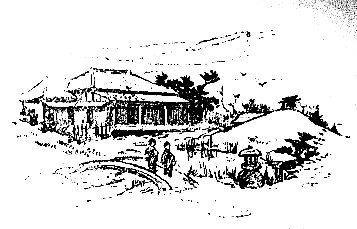
"The fairies would surely hide the place so we couldn't find it," said Taro; "but we can try. Let's go softly; then maybe they won't hear us." They tiptoed out into the garden. How I wish you could see their garden! There are all sorts of wonderful places in it! It isn't very large, but it has in it a little bit of a toy mountain, and a tiny lake with little weeny goldfish in it, and a little stream of water, like a baby river, that runs into the lake. And, best of all, there is a curved bridge, painted red, just big enough for the Twins to walk over, if they are very careful and don't bounce! The Twins' Grandfather made this garden for their Father to play in when he was a little boy, so they all love it dearly. There are iris plants and lilies beside the tiny lake, and a funny little pine tree -- a very little pine tree, just a few feet high -- grows out of some rocks on the side of the mountain. The Twins crossed the tiny red bridge and crept up the stepping-stones on the mountain-side until they reached the little pine tree. "Do you s'pose it could be the pine tree?" Take whispered. "Maybe; it's so small -- just the right size for Bōt’Chan," Taro whispered back. The Twins looked carefully all around the pine tree, but its trunk was gnarled and old. It is hard to believe that so little a tree could be so old, but the Japanese know how to keep a tree small, like a toy tree, even if it has been growing for a hundred years. This tree wasn't a hundred years old, because their Grandfather had set it out, when the Twins' Father was a little boy, and the Twins' Father wasn't anywhere near a hundred years old. 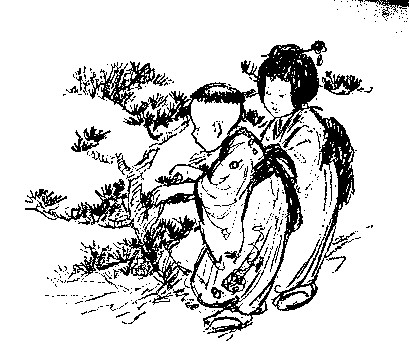
"I don't believe a darling little pink baby could ever grow here," said Take, when she had looked all around the pine tree. "Let's look at the plum tree." They ran to the plum tree that stood at the other end of the garden. They looked all about it. On the south side of the plum tree, in the sunshine, there was a long branch near the ground; and on the branch -- what do you think? -- there was a whole row of tiny pink buds, almost ready to burst into bloom "Oh, Taro, Taro, look here!" Take cried. "Here 's the Baby's very own branch; I'm sure of it, for there aren't any other buds on the whole tree that are as near out as these!" "Let's cut off this spray and carry it into the house to put in the vase," said Taro. "Oh, yes, and I'll show Mother how beautifully I can arrange it -- just the way I was taught to do it," Take answered. "Nothing could be nicer for a baby's flower than a dear little branch like this with pink buds on it!" "I'll break it for you," said Taro. "I'm strong." He broke the branch carefully, just where Take told him to. He took great pains not to tear the bark or hurt the tree. Then they carried it into the house. In one corner of the room there was a little alcove. There is one in every Japanese house. It is called the "honorable recess," and it is where their most beautiful things are placed. "There is always a picture -- or perhaps two or three of them -- hanging like long banners on the wall at the back of the "honorable recess." These banner pictures are called kakemono. There is also a small table with a vase on it standing near. In this vase there are always flowers, or a beautiful branch with green leaves. In Japan the little girls are taught to arrange flowers just as carefully as they are taught to read, so that the "honorable recess" may be kept beautiful to look at. 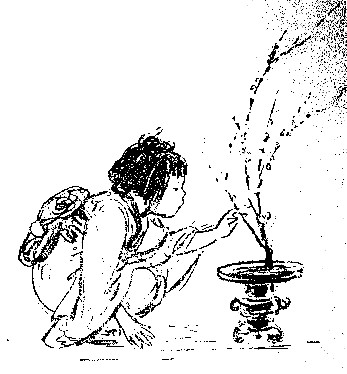
Take filled the vase with water. She fitted a little forked stick into the top of the vase, and stuck the plum branch through the crotch of the forked stick, so it wouldn't fall over. She twisted it this way and that until it looked just right. Then she called Taro to see it. On the wall of the recess was the picture of a black crow perched on the branch of a pine tree, in a rainstorm. His shoulders were all hunched up to shed the rain, and he didn't look happy at all. He looked funny and miserable. The Twins looked at the honorable recess a long time. Their Father came and looked too. Then Taro said, "I don't think that crow in the rainstorm looks right hanging up beside the plum brunch. The crow looks so sorry, and we are all so glad." 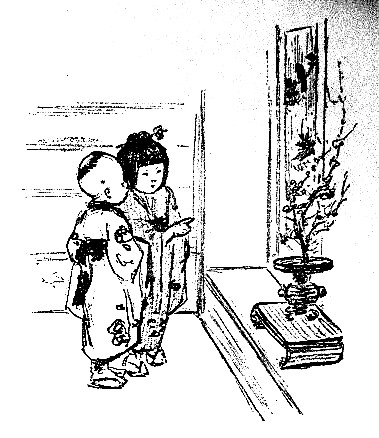
"I think just the same," said Take. "So do I," said their Father. "How would you like to go out to the Kura and see if we can find a real happy picture to hang up there." Taro and Take jumped up and down and clapped their hands for joy, they were so glad to go out to the "Kura." The "Kura" is a little fireproof house in the garden. You can see the corner of the roof sticking out from behind the mountain in the picture. In it Taro and Take and their Father and Mother and Grandmother keep all their greatest treasures. That is why Taro and Take were so glad to go there. Nearly everybody in Japan has just such a safe little house in the garden. Maybe you can guess the reason why. It isn't only because of fires. It's because of earthquakes too. Every once in a while -- almost every day, in fact -- the earth trembles and shakes in the Happy Islands. The houses are built mostly of wood and paper, and if the earth-quakes tumble them over, they sometimes catch fire, but if the nicest things are safe in the Kura, it doesn't matter so much, if the house is burned up, you see. There are always plenty of fires for boys to see in Japan. Taro had seen ever so many, before he was five years old, and the Twins had both felt ever so many earthquakes. They were so used to them that they didn't mind them any more than you mind a thundershower. All of Taro's kites were kept in the Kura. The big dragon kite had a box all to itself; Take's thirty-five dolls were there, too; -- but, dear me, -- here I am telling you about kites and dolls, when I should be telling you about the picture of the crow, and what they did with it! First the Twins' Father took it down off the wall and rolled it up. Then he took it in his hand, and he and Taro and Take all went out into the garden. When they reached the Kura, the Father unlocked the door, and all three stepped inside. It was not very light, but the air was sweet and spicy. On the shelves about the room were many beautiful boxes of all sizes and shapes. The Father reached up to a high shelf and took down three boxes, that looked just alike on the outside. He opened the first and took out a roll neatly wrapped and tied with a silk string. It was this picture of a Japanese lady who has run out quickly to take her washing off the line because of a shower of rain. He held it up high so the Twins could see it. "Ho, ho," laughed Taro. ''The lady has lost her clog, she is in such a hurry!" "She's just as wet as the crow," Take said, "and I don't believe she feels a bit happier!" "She'll be wetter still before she gets her washing in, won't she?" the Father said. "The clouds seem to have burst just over her head! And, dear me, -- how the wind is blowing her about! No, she won't do beside the plum branch." 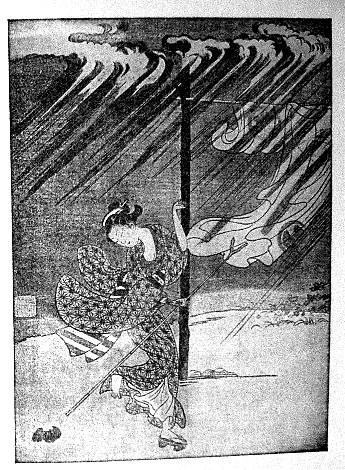
He opened another box and unrolled the next picture. Here it is.
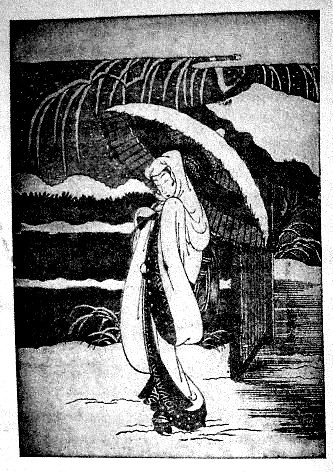
Tare and Take looked at it a long time. Then Take said, "What a beautiful dress the lady has on! I'd like to dress just like that when I grow up!" "But she is walking out in the snow with an umbrella over her head," said Taro. "It isn't winter now." Then the Father unrolled the third. "How do you like this one?" he asked. It was a picture of a bird with a grasshopper in her bill, flying to a nest with three little birds in it. The little birds had their mouths wide open. "Oh, that's the very one!" cried Take. "It's just like Mother, taking care of Taro and the Baby and me! Let's take that one." So they left that one out and carefully rolled up the others and put them back in place. They put the crow away too. The Twins were just turning round to go out the door when their Father reached down one more package from a high shelf. "Wait a minute," he said; "I have something else to show you." The package was long and thin, and the covering was a piece of silk with the family crest embroidered on it in colored silks. This was the crest. 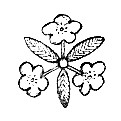
Taro and Take knew it at once, for it was embroidered or stamped upon the sleeves of their kimonos. It was the sign of their family. The Father took off this cover. Under it was a covering of brocaded silk. It seemed a long time to the Twins before it was all unwrapped, they were so eager to see what was in the package. At last their Father held up a beautiful sword with both his hands. It was a long sword, with a handle of carved ivory, and a sheath with curious designs on it. The Father bowed to the sword. "You bow to the sword also, my son," he said to Taro. "It is wonderfully made. It commands respect." Taro bowed to the sword. Then his Father drew the long blade from the sheath. He turned the edge carefully toward himself, and away from the Twins. "I want you to see this sword, Taro," he said, "for some time it will be yours, because you are my oldest son." "Whose was it?" asked Taro. "It was your Grandfather's sword," his Father answered, "and you are old enough now to know what it means. I want you to remember what I say to you as long as you live. "Your Grandfather was a gentleman, a Samurai of Japan. This was the sword he always wore. Many years ago there was trouble in Japan, and to help the Emperor, all the great dukes in the kingdom gave up their dukedoms. The Samurai also gave up their honorable positions in the service of these dukes, and became common citizens. Then your Grandfather put away his sword. Years after, when he was old, he gave it to me. But I do not wear it either, although I too am of the Samurai, and the sword is their badge of honor. It is much better to keep it safely here, and think sometimes of what it means, than to wear it only for display. You can show that you are a son of the Samurai, by acting as a gentleman should act. You do not need the sword for that. A Samurai should never do a mean thing. He should keep his life clean and shining, like the sword. And he must always do what is best for Japan, whether it is best for him or not." This was a long speech. The Twins listened with all their ears, -- four of them, -- but they did not quite understand it all. They understood that their Father loved the sword, and that some time it was to be Taro's, and that he must be a brave, good boy or he would not be worthy of it; and that was a good deal, after all. 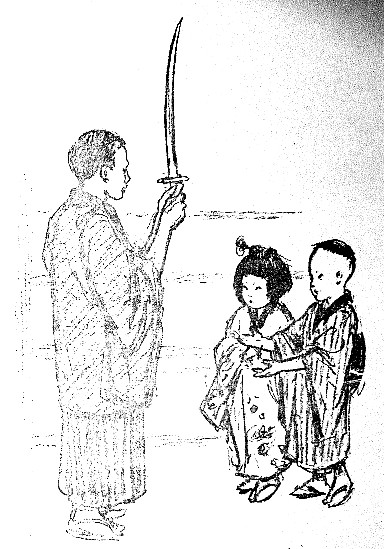
"May I touch it?" Taro asked. "You may take it in your own hands," said his Father. And he gave it to Taro almost as tenderly as he had given Bōt’Chan to Take that morning. He showed him the polite way to hold it, with the edge toward himself.
Then while Taro held
the sword, his Father said: "I want to tell you a poem that our
Emperor's father wrote while he was Emperor, and by and by when you are
bigger I want you to learn it by heart. Then, when you are a man, and
look at the sword, you will remember it. This is the poem:
The Father's voice was very solemn as he said this verse. The Twins were quite still as he wrapped the sword in its silken coverings and put it back again on the high shelf. This was a long time for Take to be quiet, but she was thinking. When their Father had locked the Kura and they were on their way to the house with the picture of the birds, she said to him, "Father, am I not a child of the Samurai, too?" "Yes, my daughter," her Father answered, "but you are a girl. It is not your fault, little one," he added kindly. "We cannot all be boys, of course. But to the keeping of the Sons is given the honor of the Family. It is a great trust." "Don't I do anything at all for the honor of my Family?" asked Take. "When you are grown up you will marry and live with your husband's family and serve them in every way you can," her Father answered. "You will belong to them, you see. Now, you must just be a good girl and mind your Father and Grandmother, and Mother, and your brothers." "I'm just as old as Taro," said little Take, "and I think I know just as much. Why can't he mind me some of the time? I think it would be fair to take turns!" "But Taro is a boy," said her Father. "That makes all the difference in the world. Japanese girls must always mind their brothers!" "Must I mind Bōt’Chan, too?" asked Take. "Yes, Bōt’Chan, too." "Won't anybody ever mind me at all?" asked Take. "When you get to be a mother-in-law, then you can have your turn," said her Father, smiling. "Your son's wife will obey you." "Will my son obey me, too?" asked Take. "No, you must obey him if he is the head of the house," her Father explained. "It's a very long time to wait," sighed Take, "and nothing but a daughter-in-law to mind me at last." 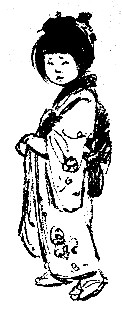
Her under lip puckered a little and she frowned -- a little frown -- right in the middle of her forehead. "Tut, tut," said her Father. "Girls and women should always be gentle and smiling. You must never frown." He looked quite shocked at the very idea of such a thing. Take tried to look pleasant, and a funny thing is that when you make yourself look pleasant, you begin to feel so, too. Take felt pleasant almost right away. They went into the house and hung the picture of the mother bird in the place of the crow, beside the spray of plum. When it was all done, this is the way the honorable recess looked. 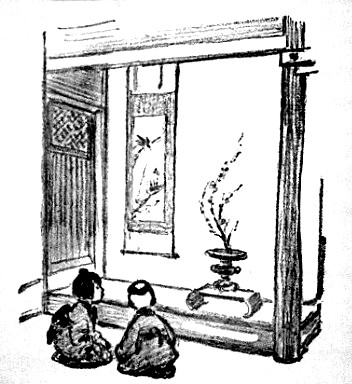
"Take looked at it for a while, and then she said, "I don't believe I shall feel sorry about minding Bōt’Chan, after all, because I love him so much." "That's the way a little Japanese girl should feel," said her Father. "Now, come in and let us take a look at him." They found Bōt’Chan awake. Take knelt down on the mat in front of him, to see him better. "Put your head down on the matting, Take," her Father said, and Take bowed her head to the floor. 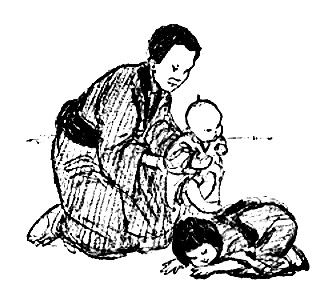
Then the Father took the Baby in his arms and placed his tiny foot on Take's neck. "That means that you must always do what he wants you to," he said. "I will," said little Take. The Mother smiled at Take as she knelt on the floor with the Baby's foot on her neck. Then she turned her face the other way on her little wooden pillow and sighed -- just a very gentle little sigh, that nobody heard at all. 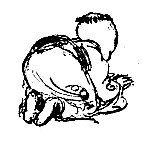
|
